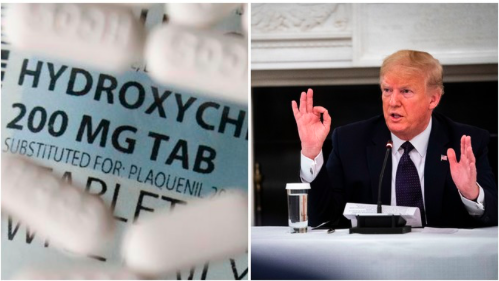

At this time, there are no drugs approved by the Food and Drug Administration (FDA) to prevent or treat COVID-19. Yet, on May 18, 2020, President Trump announced he was taking hydroxychloroquine to prevent COVID-19. So, how can the President, and others, access this prescription drug, when the FDA has yet to approve it—or any other prescription drug—to prevent or treat COVID-19?
FDA Drug Approval Process
The FDA is a federal regulatory agency within the Department of Health and Human Services, and its mission is to “protect and promote public health[.]” One of the ways in which it does this is by acting as a gatekeeper, which only approves drugs after it has determined they are safe and effective. Drug companies wishing to market a drug in the United States must submit the drug for “rigorous evaluation” by the FDA, and the drug may only proceed to market upon FDA approval.
The FDA drug review or approval process is complicated, and is specifically tailored to identify whether a drug will provide clinical benefits to those who are prescribed it for a particular, intended use. Briefly, the new drug approval process requires:
(1) the drug’s sponsor must conduct preclinical trials on laboratory animals;
(2) the sponsor must submit an investigational new drug application (IND) to the FDA, detailing the sponsor’s proposal for human testing in clinical trials;
(3) the sponsor must conduct clinical trials on humans, over the course of three phases;
(4) the sponsor must submit a new drug application (NDA) formally asking the FDA to consider a drug for marketing approval;
(5) the FDA decides within 60 days, whether to file and review the NDA;
(6) an FDA review team evaluates the NDA, specifically the sponsor’s research on the drug’s safety and effectiveness;
(7) the FDA must review the drug’s professional labeling, and the facilities where the drug will be manufactured.
Only then, if the drug survives each and every step, and the intended clinical benefit of the drug is demonstrated, will the FDA approve the drug. This process is necessary to ensure that the drug provides benefits that outweigh known and potential risks for the target condition and intended population.
Unapproved Use and EUAs
However, there is a caveat: once the FDA approves a drug for a specific or intended use, healthcare providers may generally prescribe the drug for other, unapproved uses. In other words, when the FDA approves drug X to treat condition Y, if your doctor believes drug X can help your condition Z, he or she may prescribe it to you for that purpose. This is called an “unapproved use” or “off-label” use. And, while it is completely legal, it is important for consumers and healthcare providers to understand that the FDA has not determined the drug is safe and effective for the unapproved use.
But wait, there’s more! The FDA can authorize emergency use of either nonapproved drugs or drugs approved for other uses during a public health crisis. In that case, the FDA issues an Emergency Use Authorization (EUA). An EUA allows the FDA to “facilitate access” to drugs that might treat or prevent a serious disease, like COVID-19. If the FDA issues an EUA, it is not approving the drug through the above process – the FDA is instead, only authorizing the drug’s use in an emergency situation where there are “no adequate, approved, and available alternatives.”
What does this mean for hydroxychloroquine?
Hydroxychloroquine sulfate is an FDA approved drug. But, it is important to note that the FDA has only approved hydroxychloroquine sulfate for three intended uses: to prevent and treat malaria, to treat lupus, and to treat rheumatoid arthritis. The FDA has not approved using hydroxychloroquine sulfate to prevent or treat COVID-19. This means that although hydroxychloroquine sulfate went through the process outlined above, and the FDA determined its benefits outweigh its risk for people trying to prevent and treat malaria, treat lupus, or treat rheumatoid arthritis, the FDA has not thoroughly evaluated whether hydroxychloroquine sulfate works to prevent or cure COVID-19, nor has it determined if its benefits outweigh its known risks.
However, because hydroxychloroquine sulfate has FDA approval for certain uses, healthcare providers like President Trump’s doctor may prescribe it for unapproved or off-label uses, like preventing or treating COVID-19, even though the FDA recommends against it.
But wait, what about the EUA?
The FDA issued an EUA that allows state officials to request hydroxychloroquine sulfate from the federal government to be used for certain hospitalized COVID-19 patients on March 28, 2020. Under this EUA, healthcare providers who prescribe hydroxychloroquine sulfate must “report all serious adverse events” to the FDA.
After the FDA reviewed these reports, along with other data, the FDA became concerned about “serious heart-related adverse events and death in patients with COVID-19 receiving hydroxychloroquine[.]” Accordingly, on April 24, 2020, almost a month after the EUA was issued, the FDA published a Drug Safety Communication, cautioning against use of hydroxychloroquine sulfate by anyone who is not enrolled in a clinical trial or hospitalized and under careful heart monitoring. The FDA reminded healthcare providers that hydroxychloroquine sulfate “has not been shown to be safe and effective for treating or preventing COVID-19” and recommended against prescribing it to people who are not hospitalized.
So now what?
Now, we wait. Unfortunately, there are currently no proven treatments for COVID-19. And, while President Trump and others are hopeful hydroxychloroquine will be a successful preventative measure or treatment, the FDA has yet to approve the drug for this purpose, and has gone even further, cautioning the public and healthcare providers against its use to prevent or treat COVID-19 outside of a clinical trial or hospital setting. So, be careful out there, and, please remember this article was written by a law student with no medical training.
Sources
About Emergency Use Authorizations (EUAs), FDA.gov (May 22, 2020).
Anne Gearan, Laurie McGinley, Lenny Bernstein & Ariana Eunjung Cha, Trump says he is taking hydroxychloroquine to protect against coronavirus, dismissing safety concerns, Wash. Post (May 18, 2020, 9:21 PM).
Coronavirus Disease 2019 (COVID-19) Frequently Asked Questions, FDA.gov (May 22, 2020).
Development & Approval Process, FDA.gov (Oct. 28, 2019).
Emergency Use Authorization of Medical Products and Related Authorities; Guidance for Industry and Other Stakeholders; Availability, 82 Fed. Reg. 4362 (Jan. 13, 2017).
FDA cautions against use of hydroxychloroquine or chloroquine for COVID-19 outside of the hospital setting or a clinical trial due to risk of heart rhythm problems, FDA.gov (Apr. 24, 2020).
FDA Organization, FDA.gov (Jan. 17, 2020).
Frequently Asked Questions on the Emergency Use Authorization (EUA) for Chloroquine Phosphate and Hydroxychloroquine Sulfate for Certain Hospitalized COVID-19 Patients, FDA.gov (last visited May 23, 2020).
Office of the Commissioner, Office of the Chief Scientist, Office of Counterterrorism and Emerging Threats, Emergency Use Authorization of Medical Products and Related Authorities, Guidance for Industry and Other Stakeholders, FDA.gov(Oct. 17, 2018).
The FDA’s Drug Review Process: Ensuring Drugs Are Safe and Effective, FDA.gov (Nov. 24, 2017).
What does FDA regulate?, FDA.gov (Mar. 28, 2018).
Photo courtesy of ITV.

